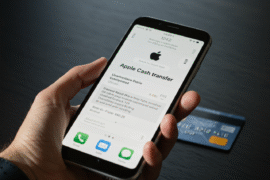This article may contain references to products or services from one or more of our advertisers or partners. We may receive compensation when you click on links to those products or services. Nonetheless, our opinions are our own.
The information presented in this article is accurate to the best of our knowledge at the time of publication. However, information is subject to change, and no guarantees are made about the continued accuracy or completeness of this content after its publication date.
Key Highlights
- An NSF (non-sufficient funds) charge is a fee your bank may charge if you don’t have enough money in your account to cover a transaction.
- These charges are typically triggered by things like checks, automatic bill payments, and certain debit card transactions.
- NSF charges differ from overdraft fees, where your bank covers the transaction but charges a fee for doing so.
- Besides the financial penalty, NSF charges can negatively impact your banking history and creditworthiness.
- Understanding NSF charges, how to avoid them, and how to minimize their impact is crucial for maintaining healthy financial habits.
Introduction
We’ve all been there. We check our account balance with hope, only to realize we don’t have enough money for upcoming expenses. If we overdraw our account, we might face an NSF charge. NSF stands for non-sufficient funds, and it can add a significant financial burden. This charge happens when we attempt a transaction without enough available funds.
Understanding NSF Charges
Financial literacy is key to avoiding costly mistakes. NSF charges occur when a bank declines a transaction due to insufficient funds. This can happen with checks, automatic bill payments, or debit card transactions.
The Basics of Non-Sufficient Funds (NSF)
Non-sufficient funds occur when your account lacks the necessary balance to complete a transaction. This often results in an NSF fee, which can lead to negative balances. It primarily affects checking accounts and can harm your banking history. Some banks offer overdraft protection, but it’s crucial to track your account balance regularly.
How NSF Fees Differ from Overdraft Fees
While both NSF and overdraft fees result from insufficient funds, they differ significantly:
- NSF Fee: Your bank declines the transaction, and you incur a fee.
- Overdraft Fee: Your bank covers the transaction, but you pay a fee for the service.
Think of it like trying to enter a concert:
- NSF Fee: You’re denied entry because you lack a ticket.
- Overdraft Fee: You’re let in, but you must pay extra for last-minute access.
Monitoring your balance helps prevent both fees and keeps you in control of your finances.
Voted "Best Overall Budgeting App" by Forbes and WSJ
Monarch Money helps you budget, track spending, set goals, and plan your financial future—all in one app.
Get 50% OFF your first year with code MONARCHVIP
The Impact of NSF Charges
NSF charges can create financial stress beyond just the fee itself. They can affect various aspects of your banking and credit history.
On Your Bank Account
NSF charges can quickly drain your checking account. Repeated occurrences may lead to additional penalties, account closures, and difficulty opening future accounts. Maintaining a positive banking history is essential to securing future financial services.
On Your Credit Score
While NSF fees don’t directly impact your credit score, they can cause indirect damage. If a bounced check leads to a missed payment, creditors may report it, lowering your credit score. Additionally, frequent NSF occurrences can be reported to ChexSystems, making it harder to open new accounts.
A good credit score is vital for securing loans, renting apartments, and even landing jobs. Avoiding NSF fees helps maintain a strong financial profile.
Beginner’s Guide to Avoiding NSF Charges
NSF charges are preventable with a few proactive strategies. Implementing these habits will keep your finances in check and reduce stress.
Recognizing the Triggers of NSF Charges
Understanding common causes of NSF charges helps you avoid them:
- Forgotten Bill Payments: Automatic payments can lead to NSF fees if your balance is low.
- Overlooked Pending Transactions: Spending based on outdated balance information can result in overdrafts.
- Unexpected Withdrawals: Subscriptions, fees, or pre-authorized transactions may reduce your available funds.
Tools and Resources You Need
Banks offer tools to help manage your balance effectively:
- Mobile Banking: Monitor real-time balances and transactions.
- Overdraft Protection: Automatically transfers funds from a linked account to prevent NSF charges.
- Account Alerts: Receive notifications for low balances or large transactions.
Strategies to Mitigate the Cost of NSF Charges
Even with precautions, NSF charges can happen. Here’s how to minimize their impact:
Opting for Overdraft Protection
Linking your checking account to a savings account or line of credit can prevent declined transactions. While some banks charge a small transfer fee, it’s often lower than NSF fees.
Negotiating with Your Bank
Many banks are willing to waive NSF fees, especially if it’s a first-time occurrence. Contact customer service and explain your situation. Highlighting a history of responsible banking can increase your chances of a refund.
Conclusion
Understanding NSF charges is crucial for financial stability. By monitoring your account, setting up alerts, and considering overdraft protection, you can avoid unnecessary fees. If you face an NSF charge, quick action and communication with your bank can help reduce the impact. Stay informed and proactive to maintain a healthy financial standing.
Frequently Asked Questions (FAQs)
What triggers an NSF charge on my account?
An NSF charge occurs when a transaction exceeds your available balance, leading your bank to decline it and charge a fee.
Can an NSF charge be waived by the bank?
Yes, many banks may waive NSF fees, especially for customers with a positive banking history. Contact your bank to request a refund.
How do NSF charges affect my credit score?
NSF charges don’t directly impact credit scores, but bounced payments reported to creditors can lead to negative marks on your credit report.
Are there alternatives to avoid NSF charges?
Yes, options include overdraft protection, maintaining a buffer in your account, and setting up account alerts for low balances.
How can I dispute an NSF charge if it was made in error?
Contact your bank immediately and provide details of the transaction. If necessary, escalate the issue to the Consumer Financial Protection Bureau (CFPB) for further assistance.

Reviewed and edited by Albert Fang.
See a typo or want to suggest an edit/revision to the content? Use the contact us form to provide feedback.
At FangWallet, we value editorial integrity and open collaboration in curating quality content for readers to enjoy. Much appreciated for the assist.
Did you like our article and find it insightful? We encourage sharing the article link with family and friends to benefit as well - better yet, sharing on social media. Thank you for the support! 🍉
Article Title: What Is an NSF Charge? The Hidden Cost of Overdrawing Your Account
https://fangwallet.com/2025/02/07/what-is-nsf-charge/The FangWallet Promise
FangWallet is an editorially independent resource - founded on breaking down challenging financial concepts for anyone to understand since 2014. While we adhere to editorial integrity, note that this post may contain references to products from our partners.
The FangWallet promise is always to have your best interest in mind and be transparent and honest about the financial picture.
Become an Insider

Subscribe to get a free daily budget planner printable to help get your money on track!
Make passive money the right way. No spam.
Editorial Disclaimer: The editorial content on this page is not provided by any of the companies mentioned. The opinions expressed here are the author's alone.
The content of this website is for informational purposes only and does not represent investment advice, or an offer or solicitation to buy or sell any security, investment, or product. Investors are encouraged to do their own due diligence, and, if necessary, consult professional advising before making any investment decisions. Investing involves a high degree of risk, and financial losses may occur including the potential loss of principal.
Source Citation References:
+ Inspo












































